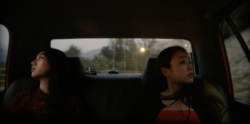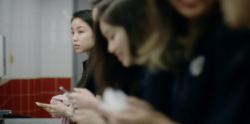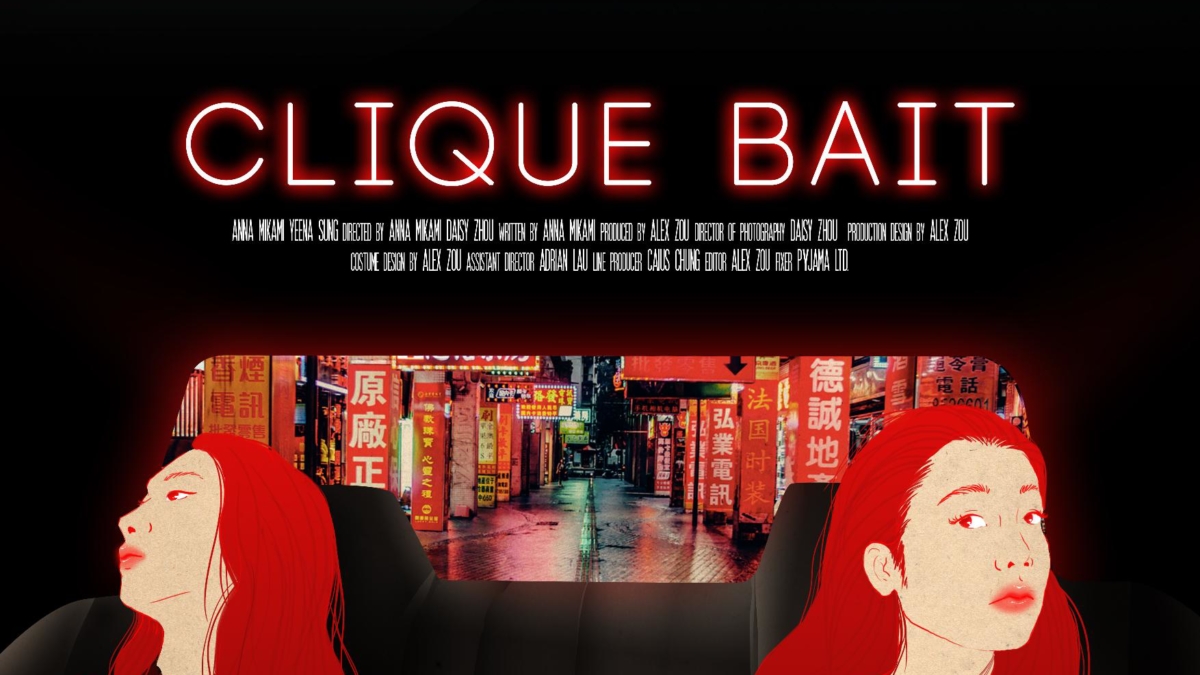In CLIQUE BAIT, director and actress Anna Mikami brings to screen Asian teenage girls as you’ve never seen them before. Set in an international high school in Hong Kong, CLIQUE BAIT’s characters come from the upper echelon in a Westernized, once-colonized country. Their conversations take place in bathroom stalls where they reapply their eyeliner, replace their uniform skirts with much shorter ones, and gossip about who got into what Ivy League, or in nightclubs where they coquettishly mingle with much older expats. This neon depiction of Hong Kong youth centers Chloe, a high school girl who spreads a racy video of Lily, an ex-childhood friend. Tailing them as they navigate the cusp of girlhood and womanhood, Chloe finds herself in the end having to sit with the consequences of the choices she has made.
CLIQUE BAIT screened as part of our WOMEN OF ALL AGES shorts block at AAIFF41. For more information about CLIQUE BAIT, visit our AAIFF41 website.
We chatted with Anna Mikami about the inspiration behind CLIQUE BAIT, the unique contradictions of growing up in a syncretic city like Hong Kong, and how CLIQUE BAIT flips the script to interrogate the anti-hero/.

How did the story behind CLIQUE BAIT come about?
Anna Mikami: CLIQUE BAIT came out of Daisy, my phenomenal cinematographer, and I just sitting and talking on a park bench in Union Square. We were trading crazy stories and experiences about our time growing up in international high schools. She had gone to high school in Shanghai and I went to school in Hong Kong. Although there’s a large population of “international kids” or “third-culture kids,” for some reason we are rarely depicted on screen. We created CLIQUE BAIT because we wanted to explore how this specific environment shapes a girl as she transitions into adulthood. In other words, we wanted to revisit our past and start a conversation about the kind of people we were.
 CLIQUE BAIT features a thorny friendship between two girls, and the main character seems almost lost as she goes through the motions of doing what a “popular” girl might– what was the inspiration behind both lead characters?
CLIQUE BAIT features a thorny friendship between two girls, and the main character seems almost lost as she goes through the motions of doing what a “popular” girl might– what was the inspiration behind both lead characters?
Anna Mikami: Since CLIQUE BAIT is loosely based off my experiences in high school, Lily was largely inspired by my own life and Chloe was based off of several girls I knew. To me, they represent two camps of girls: the girls who could and the girls who couldn’t. This social divide existed and applied to everything. Take how we express our sexuality as an example. It was a liberal enough community that everyone could probably get an A if they had to give a TED talk on slut-shaming. But there still existed a divide between the popular girls who could do whatever they wanted with their bodies, while the rest of the girls would be stigmatized if they tried. Even if you were lucky enough to be one of the girls who could, there is a limit and some girls like Chloe, found out the hard way.
How much did Hong Kong itself serve as a character in this movie?
Anna Mikami: Hong Kong as a character represents the product of clashing cultural values. Living there felt like being on a testing ground of unspoken contradictions. We studied white supremacy in our textbooks, but generations of colonialism still instilled pride in us when we kissed a white boy. Feminism was cool, but overstepping the boundaries of sexual expression was punished. Bullying in the form of a fist was condemned, but condoned when it took the form of gossip-mongering, shaming, exclusion, and any other form that remained elusive to the eye of the Ivy Leagues we applied for.
CLIQUE BAIT had a bit of an ominous tone for me and I kept thinking that something bad was going to happen to the main character. It made me feel like I was unable to protect someone who seems to oscillate between girl and woman as she makes decisions that lead to its own consequences. In the end, what does happen is pretty much self-inflicted. How does CLIQUE BAIT fit into or challenge the coming of age story for you?
Anna Mikami: By definition, CLIQUE BAIT is a coming-of-age story but it challenges the form by following the antagonist. Chloe is an unlikeable character. She is the bully in the situation, but she’s still relatable because her mistakes are the product of the same insecurities I know I felt growing up. I had originally written the script from Lily’s perspective but decided to flip it to understand what drives girls like Chloe to do the things they do. By getting into Chloe’s head, I hope it encourages the audience to examine their own actions or inactions.
 What are you looking forward to working on next? Are you working on other stories that also look closely at the interiority of women?
What are you looking forward to working on next? Are you working on other stories that also look closely at the interiority of women?
Anna Mikami: I’m very excited to be finishing up post-production for an upcoming short film. And yes, I do tend to write stories about women because there’s just so much to work with. For future updates or inquiries, feel free to visit www.annamikami.com

